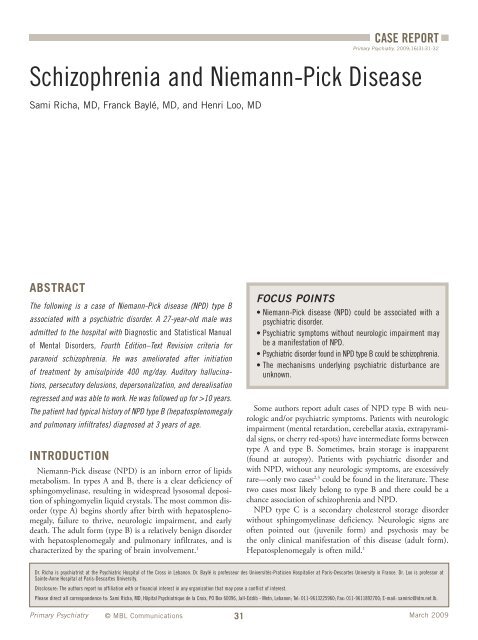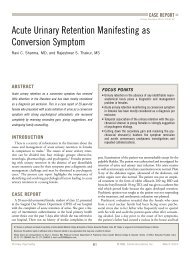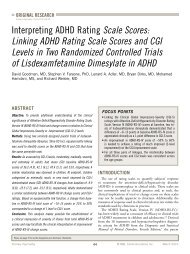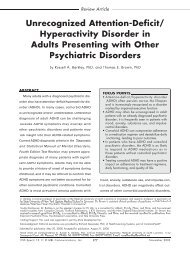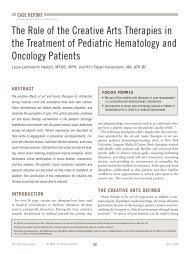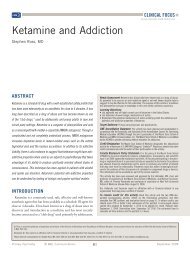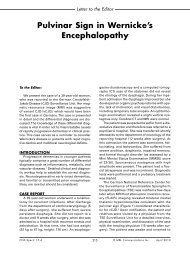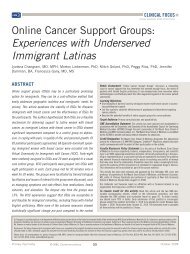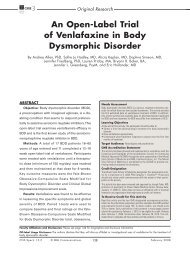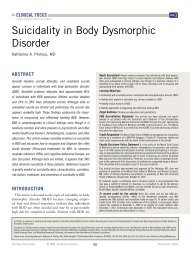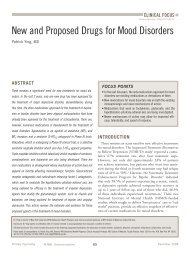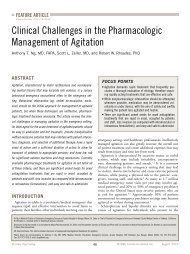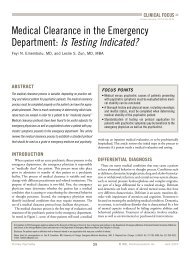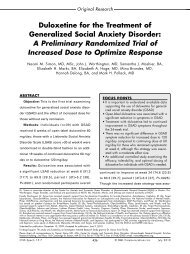Schizophrenia and Niemann-Pick Disease - MBL Communications
Schizophrenia and Niemann-Pick Disease - MBL Communications
Schizophrenia and Niemann-Pick Disease - MBL Communications
You also want an ePaper? Increase the reach of your titles
YUMPU automatically turns print PDFs into web optimized ePapers that Google loves.
<strong>Schizophrenia</strong> <strong>and</strong> <strong>Niemann</strong>-<strong>Pick</strong> <strong>Disease</strong><br />
Sami Richa, MD, Franck Baylé, MD, <strong>and</strong> Henri Loo, MD<br />
ABSTRACT<br />
The following is a case of <strong>Niemann</strong>-<strong>Pick</strong> disease (NPD) type B<br />
associated with a psychiatric disorder. A 27-year-old male was<br />
admitted to the hospital with Diagnostic <strong>and</strong> Statistical Manual<br />
of Mental Disorders, Fourth Edition–Text Revision criteria for<br />
paranoid schizophrenia. He was ameliorated after initiation<br />
of treatment by amisulpiride 400 mg/day. Auditory hallucina-<br />
tions, persecutory delusions, depersonalization, <strong>and</strong> derealisation<br />
regressed <strong>and</strong> was able to work. He was followed up for >10 years.<br />
The patient had typical history of NPD type B (hepatosplenomegaly<br />
<strong>and</strong> pulmonary infiltrates) diagnosed at 3 years of age.<br />
INTRODUCTION<br />
<strong>Niemann</strong>-<strong>Pick</strong> disease (NPD) is an inborn error of lipids<br />
metabolism. In types A <strong>and</strong> B, there is a clear deficiency of<br />
sphingomyelinase, resulting in widespread lysosomal deposition<br />
of sphingomyelin liquid crystals. The most common disorder<br />
(type A) begins shortly after birth with hepatosplenomegaly,<br />
failure to thrive, neurologic impairment, <strong>and</strong> early<br />
death. The adult form (type B) is a relatively benign disorder<br />
with hepatosplenomegaly <strong>and</strong> pulmonary infiltrates, <strong>and</strong> is<br />
characterized by the sparing of brain involvement. 1<br />
Primary Psychiatry<br />
31<br />
Some authors report adult cases of NPD type B with neurologic<br />
<strong>and</strong>/or psychiatric symptoms. Patients with neurologic<br />
impairment (mental retardation, cerebellar ataxia, extrapyramidal<br />
signs, or cherry red-spots) have intermediate forms between<br />
type A <strong>and</strong> type B. Sometimes, brain storage is inapparent<br />
(found at autopsy). Patients with psychiatric disorder <strong>and</strong><br />
with NPD, without any neurologic symptoms, are excessively<br />
rare—only two cases 2,3 could be found in the literature. These<br />
two cases most likely belong to type B <strong>and</strong> there could be a<br />
chance association of schizophrenia <strong>and</strong> NPD.<br />
NPD type C is a secondary cholesterol storage disorder<br />
without sphingomyelinase deficiency. Neurologic signs are<br />
often pointed out (juvenile form) <strong>and</strong> psychosis may be<br />
the only clinical manifestation of this disease (adult form).<br />
Hepatosplenomegaly is often mild. 1<br />
Dr. Richa is psychiatrist at the Psychiatric Hospital of the Cross in Lebanon. Dr. Baylé is professeur des Universités-Praticien Hospitalier at Paris-Descartes University in France. Dr. Loo is professor at<br />
Sainte-Anne Hospital at Paris-Descartes University.<br />
Disclosure: The authors report no affiliation with or financial interest in any organization that may pose a conflict of interest.<br />
Please direct all correspondence to: Sami Richa, MD, Hôpital Psychiatrique de la Croix, PO Box 60096, Jall-Eddib - Metn, Lebanon; Tel: 011-9613225960; Fax: 011-9611892700; E-mail: samiric@idm.net.lb.<br />
© <strong>MBL</strong> <strong>Communications</strong><br />
FOCUS POINTS<br />
CASE REPORT<br />
Primary Psychiatry. 2009;16(3):31-32<br />
• <strong>Niemann</strong>-<strong>Pick</strong> disease (NPD) could be associated with a<br />
psychiatric disorder.<br />
• Psychiatric symptoms without neurologic impairment may<br />
be a manifestation of NPD.<br />
• Psychiatric disorder found in NPD type B could be schizophrenia.<br />
• The mechanisms underlying psychiatric disturbance are<br />
unknown.<br />
March 2009
S. Richa, F. Baylé, H. Loo<br />
CASE REPORT<br />
The following is a case report of NPD type B associated<br />
with a psychiatric disorder. A 27-year-old male was<br />
admitted to the hospital. He met Diagnostic <strong>and</strong> Statistical<br />
Manual of Mental Disorders, Fourth Edition–Text Revision 4<br />
criteria for paranoid schizophrenia. He had auditory hallucinations<br />
<strong>and</strong> persecutory delusions. He also had feelings<br />
of strong depersonnalization <strong>and</strong> derealization. Since 3 years<br />
of age, he had magical thinking <strong>and</strong> ideas of reference <strong>and</strong><br />
had reduced his social activity. There were no neurologic<br />
or intellectual impairments. He had no history of developmental<br />
disorder. There was no drug abuse. The patient<br />
had a typical history of NPD type B (hepatosplenomegaly<br />
<strong>and</strong> pulmonary infiltrates) diagnosed at 3 years of age.<br />
The sphingomyelinase activity in leucocyte extracts was at<br />
0.10 µKat/Kg proteins (normal at 0.67±0.25). Computed<br />
tomography scan <strong>and</strong> magnetic resonance imaging revealed<br />
a slight ventricular enlargment. An electroencephalograph<br />
indicated no abnormalities. There was no ocular abormality.<br />
Motor nerves conduction velocities were normal.<br />
He was ameliorated after initiation of treatment by amisulpiride<br />
400 mg/day. Auditory hallucinations, persecutory<br />
delusions, depersonnalization, <strong>and</strong> derealisation regressed<br />
<strong>and</strong> he was able to work. The patient has been followed up<br />
for >10 years. He worsened every time he discontinued<br />
amisulpiride or reduced the posology of 400 mg/day; the<br />
relapse was on the same mode, including delusions, hallucinations,<br />
<strong>and</strong> behavioural disturbance.<br />
This is the third case of NPD type B associated with a<br />
psychiatric disorder, 3 the first which presented NPD before<br />
schizophrenia. Hepatosplenomegaly had developped before<br />
the onset of psychiatric symptoms. Complete exploration<br />
of the central nervous system revealed no abnormality. The<br />
mechanisms underlying psychiatric disturbance are unknown.<br />
The authors of this case report could make no correlation<br />
between brain damage <strong>and</strong> psychiatric symptoms.<br />
CONCLUSION<br />
Psychiatric symptoms without neurologic impairment may<br />
be a manifestation of NPD (intermediate type AB) or a chance<br />
association (type B). In this case presented, the presence of enzyme<br />
protein in fibroblasts revealed an intermediate type AB. PP<br />
REFERENCES<br />
1. Spence MW, Callahan JW. Sphingomyelin-cholesterol lipidoses : The <strong>Niemann</strong>-<strong>Pick</strong> Group of <strong>Disease</strong>s. In:<br />
Scriver C, Beaudet AL, Sly WS, Valle D, eds. The Metabolic Basis of Inherited <strong>Disease</strong>s. 6th ed. New York,<br />
NY: McGraw-Hill; 1989:1655-1676.<br />
2. Dubois G, Mussini JM, Auclair M, et al. Adult sphingomyelinase deficiency: report of 2 patients who<br />
initially presented with psychiatric disorders. Neurology. 1990;40(1):132-136.<br />
3. Sogawa H, Horino K, Nakumara F, et al. Chronic <strong>Niemann</strong>-<strong>Pick</strong> disease with sphingomyelinase deficiency<br />
in two brothers with mental retardation. Eur J Pediatr. 1978;128(4):235-240.<br />
4. Diagnostic <strong>and</strong> Statistical Maual of Mental Disorders. 4th ed, text rev. Washington, DC: American<br />
Psychiatric Association; 2000.<br />
Primary Psychiatry © <strong>MBL</strong> <strong>Communications</strong> 32<br />
March 2009


